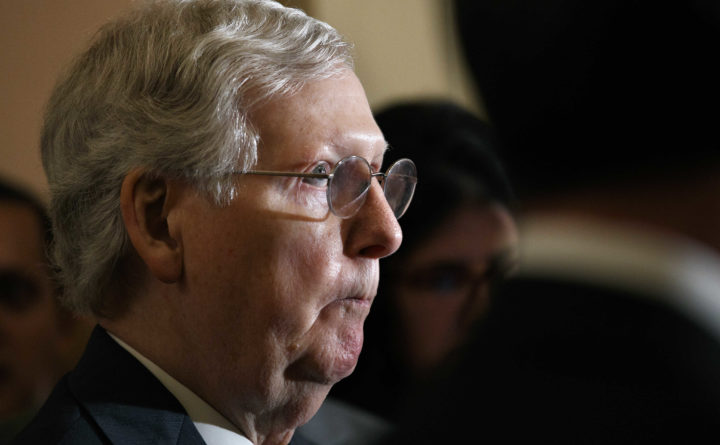Several years ago, David Roberts suggested that the GOP had become the post-truth party.
They talk about cutting the deficit even as they slash taxes on the rich and launch unfunded wars. They talk about free markets even as they subsidize fossil fuels. They talk about American exceptionalism even as they protect fossil-fuel incumbents and fight research and infrastructure investments.
In short, Republicans have mastered post-truth politics. They’ve realized that their rhetoric doesn’t have to bear any connection to their policy agenda. They can go through different slogans, different rationales, different fights, depending on the political landscape of the moment. They need not feel bound by previous slogans, rationales, or fights. They’ve realized that policy is policy and politics is politics…The two have become entirely unmoored.
Republicans knew that if they were honest about their agenda, it would be wildly unpopular with voters.
But something changed during Obama’s presidency. As I have often suggested, that is because the Bush/Cheney administration demonstrated that Republican policies (both foreign and domestic) were an utter disaster. So they went with a policy of total obstruction. Republicans no longer had to talk about policy goals, they simply opposed everything Democrats tried to do. As Steve Benen wrote, they quit trying to govern and became the post-policy party.
In 2014, when Republicans regained a majority in the Senate – thus controlling both houses of congress – McConnell and Boehner released a joint statement promising “to help struggling middle-class Americans who are clearly frustrated by an increasing lack of opportunity, the stagnation of wages, and a government that seems incapable of performing even basic tasks.” That didn’t work out so well. The leaders spent most of their time attempting to deal with the “lunatic caucus,” which repeatedly attempted to shut the government down if their demands weren’t met. Eventually Speaker Boehner reached an agreement with them that included his resignation.
Donald Trump actually adopted a Newt Gingrich approach, releasing a Contract with the American Voter just prior to the 2016 election. But over the course of four years, not much of it got enacted. The one exception was tax cuts – which, contrary to Trump’s promise, benefited primarily the wealthy.
Heading into the 2020 election, the GOP decided that they wouldn’t bother putting together a party platform at their convention. Instead, they simply promised to support whatever the Trump administration wanted to do.
As talk about the 2022 midterms heats up, Minority Leader McConnell has completely eschewed the idea of putting forward any policy goals. As Axios reports, he recently met with a group of donors, lobbyists, and Republican senators up for re-election. When a donor asked “what are we going to be running on to help us win,” this is how McConnell responded:
Senate Republicans won’t release a legislative agenda before next year’s midterms, according to people who’ve attended private meetings with the minority leader…. Every midterm cycle, there are Republican donors and operatives who argue the party should release a positive, proactive governing outline around which candidates can rally. McConnell adamantly rejects this idea, preferring to skewer Democrats for their perceived failures.
McConnell is perfectly happy for Republicans to simply run on a platform of painting Democrats as extremists who are out to destroy our country. That is for several reasons. First of all, he has a long history of being a post-truth politician, knowing that his real agenda is still terribly unpopular with voters, as Steve Benen suggests.
[I]f Republicans bundled together some of their vague policy preferences into some kind of 2022 agenda, it’d be filled with unpopular ideas that Democrats would gladly use against them. After all, what do contemporary GOP officials want? Tax breaks for the wealthy, weaker social-insurance programs that families depend on, weaker gun laws, and a systemic effort to roll back the clock on reproductive rights, voting rights, civil rights, and environmental protections.
It’s a tough sell for a party that wants to win.
Secondly, over the last decade, the ranks of Republicans in congress have gotten more and more extreme. As Boehner and McConnell found out following the 2014 midterms, the party seems to have lost its ability to govern and might actually function better in the minority.
Finally, McConnell spent the four years of Trump’s presidency passing tax cuts for his wealthy donors and stacking the courts with conservative extremists. Regardless of what happens in elections, the latter is how he plans to secure his legacy. Actual governing be damned.
It almost makes you wonder whether McConnell cares about winning back a senate majority.




Maybe he’ll focus on keeping him and his family out of jail.